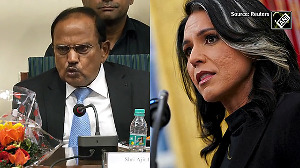India made plain its opposition to China on issuance of stapled visas to Kashmiris and developmental work in Pakistan-occupied Kashmir on Wednesday, even as the two sides inked an agreement to set up a hotline between their prime ministers.
"We do not accept the stapled visas on the passports of residents from Jammu and Kashmir. Our position in this regard was again made clear during the talks," Foreign Secretary Nirupama Rao told journalists.
India maintains that Jammu and Kashmir is its integral part and there should be no discrimination between residents of the state and rest of the country.
Rao, who briefed media on the talks External Affairs Minister S M Krishna had with the Chinese leadership, said, "They (the Chinese side) listened attentively to what we said.
We underlined the need for more sensitivity to be shown to Indian concerns in this regard. This is a subject of ongoing discussion with China. That is where it stands at the moment."
She said the minister strongly conveyed India's concerns over China stapling visas for residents of Jammu and Kashmir, during his meeting with his Chinese counterpart Yang Jiechi.
The agreement for setting up hotline between Prime Ministers Manmohan Singh and Wen Jiabao would enable the two leaders to hold direct conversations. The decision to set up the hotline was reached during a meeting between Singh and Chinese President Hu Jintao in the Russian city of Yekaterinburg in June 2009.
The establishment of the hotline showed how close India and China were with each other, Krishna said.
Krishna, who wrapped up his four-day visit, called on Wen and raised the issue of China supporting India's candidature for a permanent seat in the United Nations Security Council.
India has been asking China to review its policy on UN reforms, saying the interests of both countries converged on several issues, including climate change and world trade and this can be further bolstered through active cooperation.
"The Chinese position in this regard was as encapsulated in the joint statement issued after Prime Minster Singh's visit to China in 2008," Rao said.
The joint statement had said China attached "great importance" to India's position as a major developing country in international affairs.
"The Chinese side understands and supports India's aspirations to play a greater role in the United Nations, including in the Security Council," it had said.
During the talks, Krishna also raised New Delhi's concerns over China undertaking development projects in Pakistan-occupied Kashmir.
"Yes, the matter was raised. Our concerns were conveyed," Rao said.
"The Chinese side was given the full picture of why we feel this way about their activity in Pakistan-occupied Kashmir," Rao said.
New Delhi has been apprehensive over Chinese construction activities in PoK and has reiterated that Jammu and Kashmir is an integral part of India and any construction there by a foreign body is illegal.
The Chinese stand was that the Kashmir issue between India and Pakistan should be resolved through bilateral dialogue in a peaceful way. "What they (China) do in PoK is without prejudice to their position on PoK," Rao said.
She said Krishna also raised the issue of the detention of 21 diamond merchants from Gujarat by China on charges of smuggling and emphasised that the legal process should be conducted in a transparent manner.
Rao said the Chinese side promised to continue to provide access to the Indian officials to the detainees. It also agreed to allow the family members of the detained persons to meet them between April 7 and 9.
On the boundary question, Rao said both sides agreed that the mechanism established with the Special Representatives to resolve the issue yielded progress as they worked out guiding principles and political parameters that can form the framework for boundary settlement.
"Both sides understand that it is a complex issue. It needs patience to solve it. There is a political will to move forward and narrow down the differences on it and to seek peaceful negotiated settlement to this outstanding issue.
While these efforts are on, peace and tranquillity on the boundary should be maintained," she said.
Wen told Krishna that China would work with India to increase mutual trust to "properly solve" border issues between the two nations.
History had proved that common development between China and India was beneficial to both, Wen was quoted as saying by state-run Xinhua news agency.
"The good-neighbourly friendship and common development are in accordance with the interests of the two countries, of Asia and of the world at large," Wen said.
"The establishment of this hotline indicates that the China-India relationship would become closer," Wen told Krishna. "Please convey my cordial greetings and best wishes to Prime Minister Singh and (UPA chairperson) Sonia Gandhi," Wen said.
"We warmly welcome your President (Pratibha Patil) visit to China," he said, adding that two countries must step up cultural and people-to-people exchanges this year being celebrated as the 60th year of diplomatic relations between the two countries.
"In a word this year should be considered as year of friendship in India-China relations," Wen said and hoped the two nations would expand cooperation and coordination both bilaterally and internationally.






 © 2025
© 2025